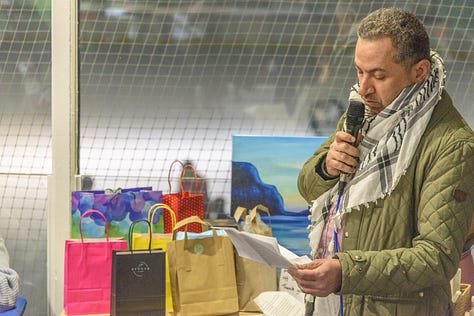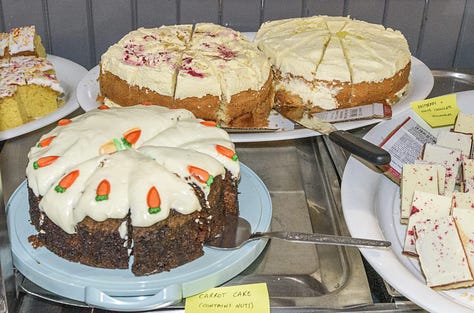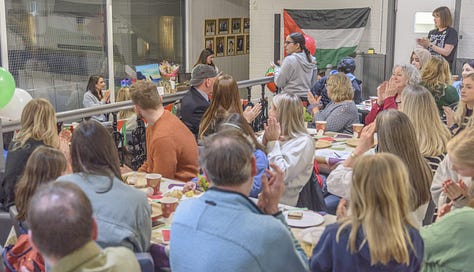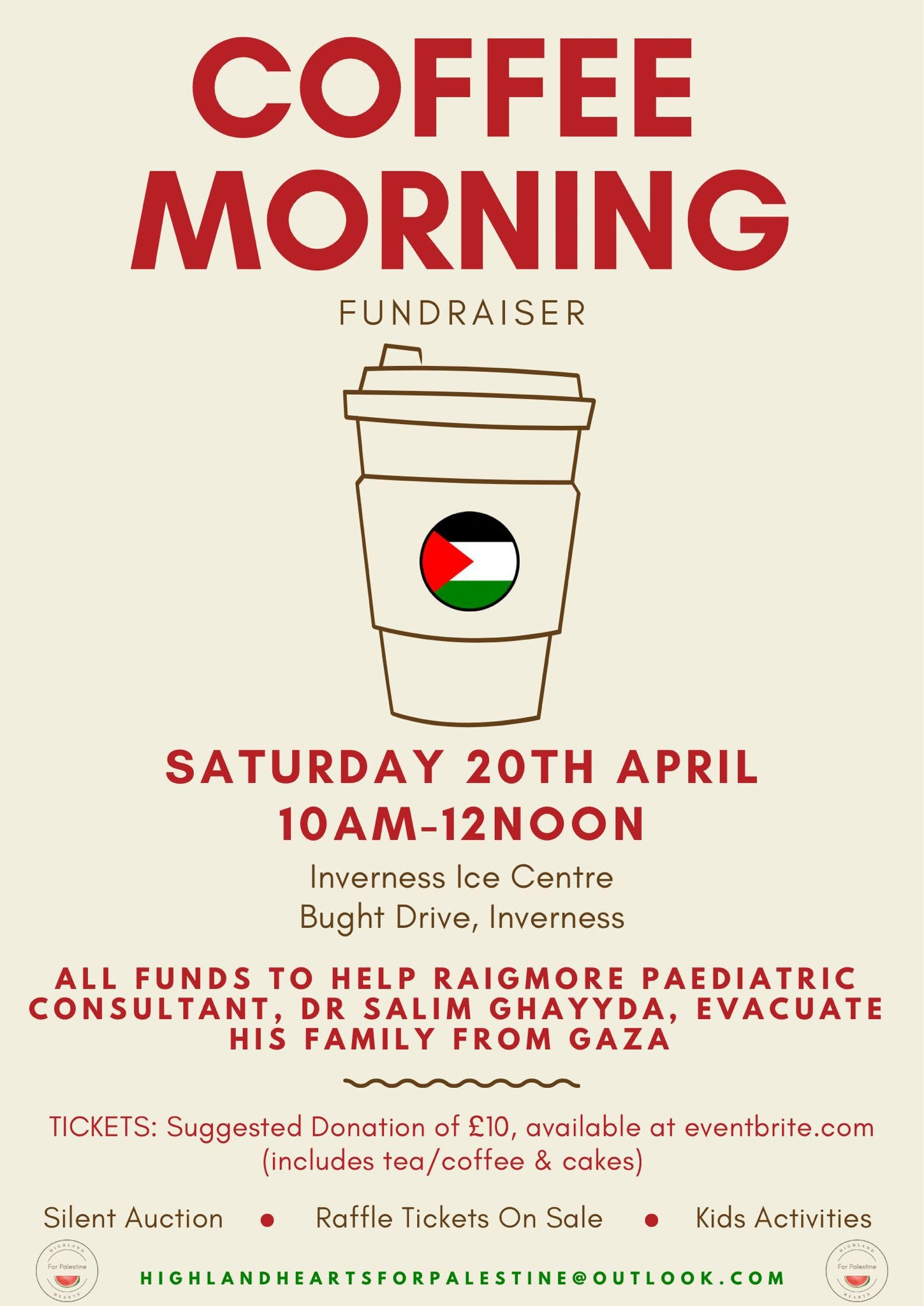Coffee Morning Fundraiser for the Ghayyda Family Inverness
A well-attended, hugely successful event (videos included below).









This morning fundraiser event in Inverness was a huge success. A group of amazing women, ‘Highland Hearts for Palestine’, organised this event to raise funds for the Ghayyda family to help them evacuate as many members of their family from Gaza as possible. The event was sold out within days of being publicised.
The Ice Centre in Inverness was the perfect venue. It enabled a warm, vibrant, child-friendly, community atmosphere, where it was easy to connect with people. There was so much incredible food, a lot of which was prepared and donated by participants.
Over one hundred and thirty people attended this morning. I was delighted to see so many mothers holding tiny babies. There were plenty of toddlers, children, and young people who were all fully present, relaxed, and attentive. There were activities for children and it was clear that they felt cared-for.
The organisers told me that in addition to those who attended this morning, hundreds more made generous donations towards the Ghayyda family fundraiser. It is so heartwarming to see so much support for the Palestinian people here in our small city of Inverness. I wish this was not necessary, but Palestinian people everywhere need to know that fellow human beings in their communities are standing with them. I hope similar events are organised elsewhere in the world. If not for fundraising, then maybe just for solidarity, and to help educate the public about what Israel has been doing in Palestine for seventy-five long years, and how the genocide in Gaza fits in that context..
Below is the text of the speech I gave, and the links to the videos of Dr Salim Ghayyda’s address, and my own.
The videos were recorded on my iPad, so are not professional quality. But you can hear our voices well, and get a sense of the event and the atmosphere.
Feel free to share this post or any part of it widely.
The Text of My Speech at the Ghayyda Family Fundraiser
I was born, raised and educated in Israel. My grandparents on my mother’s side were holocaust survivors, and I served in the Israeli army between 1982 and 1984. In 2001, ten years after emigrating to Australia, I renounced my Israeli citizenship.
These ‘credentials’ do not give me more right to speak here, than anyone else. But they do mean that I am fluent in Hebrew, and can watch and read the Israeli media. I also have some insight into Jewish Israeli society, its psychology, and its aims. I do not misunderstand Israel, and its intentions. I am not confused by the misinformation disseminated by our media. I know what Jewish Israelis say to one another in Hebrew inside their country. I know what their media show them, and how they portray Gaza and Israel’s military.
I am privileged and humbled to have been invited to speak at this fundraiser. I have been wondering what I could possibly say here that would make any kind of useful contribution. I then realised there are two aims I would like to achieve.
First, I want to express my gratitude to you for supporting Salim and his family. For abuse and harm to be inflicted, you need three players. You need a perpetrator, a victim, and a bystander. Without bystanders it would be much harder for perpetrators to commit crimes against others, and victims would not feel abandoned as they so often feel. You are not bystanders!
My second hope is that at least some of what I have to say will encourage you and others to feel complete confident in your activism. It should be the norm for humans to support other humans who happen to be victims of injustice and abuse. But sadly, victims are often abandoned, and perpetrators like Israel are indulged and enabled. Your support should be the norm, but sadly it is not. You therefore deserve full recognition for it. In times like ours it is important to think about which side of history we choose to be on. You choose to send the message to Salim, Hala and their families, and to all Palestinians that you think of them, and are not silent or complacent in the face of their suffering.
In 2012, I published Beyond Tribal Loyalties. The book includes contributions from twenty-five Jewish activists from around the world. Each of the contributors tells the story of how they liberated themselves from their Zionist brainwashing. In my contribution I share some of the early experiences that later in life helped to awaken me to the truth of what Israel is and what it has been doing to the Palestinian people from its early beginnings.
I would like to read to you two experiencs as I describe them in the book:
“For several years as I walked to and from school, I would pass by building sites where more apartment blocks like ours were being built. The labourers who built them were all “Arabs”. I knew they were Arab from the derogatory comments that I would frequently hear about them. I was told that they hated us and that they did avoda aravit, meaning “Arab labour”, a common phrase meaning poor quality workmanship.
I didn’t know who these “Arabs” were but I knew that they weren’t like “us” and that they were somehow dangerous. They wore shabby clothes covered with dust and lime, woollen beanies (skullcaps), and worn, dusty dress shoes that didn’t look right for the work they were doing. I remember a few times when I dared to look up at the scaffolding and my eyes would briefly meet the eyes of one of the men. I saw something in those eyes that bothered me, something like anger mixed with insult1.
Occasionally one or two of the men would smile at me as I walked past. I never smiled back because I knew that I wasn’t supposed to. So, I would just lower my eyes and hurry along in horror. Many years later I began to wonder what these men felt when I did that, how hurtful it must have been that even a little girl couldn’t acknowledge them as human beings. I wondered whether they had children my age back home and what their real occupations might have been.
When I was about thirteen, there was a recruitment drive at our school. A friendly, cheerful man came to our class to invite us to a meeting; something to do with volunteering for our country. I couldn’t quite get what it was all about. When I tried to ask, I was told that I should just come to the meeting and all would be made clear.
At the meeting I found out that the recruitment was for HAGA, (HAGA is a Hebrew acronym that stands for Hagana Ezrachit, or Civil Defence. I don’t know if it still exists, but back then HAGA was responsible for keeping order on the home front in wartime).
We were told there was something new called ‘Young HAGA’, and that they wanted young people to volunteer. I still couldn’t understand what it was about exactly, but I was also flattered and excited that they wanted us. I don’t remember much more except that one evening I had to go on my first “patrol” in a van with some other children my age and three armed men. Being around armed men wasn’t unusual. We always had two armed male parents or teachers accompany us on school excursions, and I was also used to seeing armed soldiers in the street or on the bus on their way to and from their bases. Not only did it not feel disturbing, it made me feel safe. That evening, I felt like I was part of something important made all the more exciting by the mystery surrounding it.
When the van stopped, I was disappointed to discover that we were not far from where I lived, at a building site much like those in my own street. Then someone opened the van door. All I remember was seeing a man, an Arab labourer, covered with lime and wearing the typical knitted beanie. He was sleeping. One of the men from the van woke him up with a kick and yelled something. The man seemed confused and disoriented and then the van door closed and we weren’t allowed to see anymore.
I don’t know what happened to this poor man, but afterwards someone finally explained that the purpose of our patrol was to look for Arab labourers who stayed in building sites overnight. They were considered a security risk and weren’t allowed to stay there. I don’t know what I thought, but I remember feeling let down and disturbed and that it was wrong somehow. I never went back and I never spoke to anyone about it. I also felt like a quitter, like I was not brave enough and that I should have continued in this “volunteering”. The face of that labourer, the way his body was curled up on the ground, surrounded by building materials haunts me to this day.
Much later in life I learned that these labourers came from the Gaza strip, about fifty miles away. They’d have to stand at the Gaza border crossing before dawn every morning, hoping that Israeli contractors in search of cheap labour would pick them for that day’s work. It was like a slave market. These men did hard physical labour for less than the minimum wage, and with none of the conditions afforded to Jewish workers. These were not proper jobs, and work was not guaranteed from one day to the next. When they stayed in the building sites overnight, these men slept in appalling makeshift conditions with no proper shelter or sanitation. But they had to provide for their families in Gaza, and this was the only way to guarantee another day’s work. It is not unusual for settler-colonisers to exploit the indigenous people whom they pushed to destitution and economic desperation.”
When Salim spoke in Inverness at a recent Highland Palestine vigil, he said he was born in Gaza and that he is fifty-one. I will be sixty in September. When Salim was born, I was in primary school. It was then that I was walking past those building sites on the way to and from school. I don’t know the story of Salim’s or Hala’s families. I am guessing that their parents were children, when their grandparents were driven out at gun point from their homes along with their entire community. If it wasn’t Salim’s, or Hala’s fathers who were forced to stand in the early morning hours for a chance of a day’s work in Israel at minimum wage, if they themselves did not work on one of those building sites, it would have been a neighbour, friend, or a relative. It could have even been Salim and Hala’s grandfather and grandfather’s generation who watched their world crumble as Israel built itself on its ruins. Salim and Hala’s parents would remember those times well.
When you grow up in Israel you are expected to be desensitised to the suffering of the Palestinian people. The vast majority of Israeli Jews support genocide, not just in Gaza but all over historic Palestine. This support has been carefully cultivated with powerful and sophisticated indoctrination that includes racist dehumanisation of the Palestinian people, who are the victims of Zionist Israeli settler-colonialism.
I am concerned that if I talk too much about my upbringing and about Israel’s deranged psychology, it might seem like I am giving an excuse for the inexcusable. There is no excuse for the hatred and paranoia that leads to uninhibited ongoing oppression and torture, and ultimately to genocide. When human beings face other human beings, when soldiers destroy homes where only a few days earlier families lived their daily lives, they can see what they are doing. If they continue to do what they do despite what they see, it is on them.
Something has to awaken in every human being when they do harm to others, no matter how much indoctrination they have received, or how justified they might feel they are. Something inside them has to tell them to draw a line somewhere, and to do no harm. If nothing awakens, and soldiers continue to use excuses, rationalisations, and justifications, every last one has to be held responsible for war crimes. You cannot blame what they do on indoctrination. Human beings should know better.
There is only one reason to talk about Israel’s psychology. It is to make it absolutely clear to the whole world that Israel will not change from the inside. Any hope that some people might harbour that Israel can change on its own accord is misguided.
The tiny minority of whistle-blowers, and anti-Zionists in Israel are vastly overwhelmed by a majority that supports the removal of all Palestinians from historic Palestine. Israeli Jews on the whole believe that they will finally have ‘peace’ and they will be able to relax when all the Palestinians are gone. But they are of course mistaken. The problem is not outside of them. It is inside of them.
Our media like to show these anti-Netanyahu demonstrations in Israel, implying that it is Netanyahu that is the ‘bad guy’ who is just misleading his people. But do not confuse anti-Netanyahu sentiments with any sort of compassion for the Palestinians.
Israeli Jews wanted a genocidal maniac at the helm to ‘solve’ their ‘Palestinian problem’ once and for all. They chose him deliberately. But they want the same psychopath to also be democratic, kind, and economically fair to them.
Most of my family live in Israel, and every last one of them is a racist Zionist. They believe that their (alleged) survival justifies the removal of all the Palestinians from historic Palestine. It is difficult for me to find sympathy for their discomfort. If you elect a psychopathic genocidal maniac into power to solve some problem you think you have, do not be surprised if they are not very nice. Perpetrator societies are not psychologically well. You cannot base a society on settler-colonialism, ethnic cleansing, racism, exploitation, and dehumanisation and expect it to be well.
Societies that are held together by racism and the scapegoating of others are bound to be poisoned by the same toxicity they direct at their chosen scapegoats. Once again, I am not excusing Israel. No trauma or psychological difficulties, justify inflicting harm on others. Nothing does!
When Salim read a text from his brother who is trapped with his wife and eighteen month old daughter in the north of Gaza, images from the Warsaw Ghetto immediately popped into my head. Growing up in Israel we were fed endless stories about the holocaust. In primary school the stories revolved especially around children, and what they suffered. The message was that if we were born at that time in history, it would have been us. If we did not want this to happen to us, we would have to be loyal to the state of Israel, which we were told is the only thing standing between us and another holocaust.
The majority of Israeli Jews try to avoid watching real reports from Gaza. But this does not mean they do not know what is going on there. Their soldiers, those war criminals who enforce Israel’s genocidal settler-colonialism are ordinary citizens, fathers, husbands, wives, sons and daughters. Anyone who knows Israeli society, knows that there are few secrets there. I cannot imagine that I am the only one who would have images from the holocaust pop up when watching what is happening in Gaza. Israel has had a long relationship with Gaza that the world is unaware of. Israeli Jews have always known that life in Gaza was horrible. When I was a child the phrase in Hebrew for ‘go to hell’, was Lech Le’Aza. Go to Gaza. They know!
Salim and his family have done nothing wrong. The Palestinians as a people have done nothing wrong. They just happened to be there, living on the land that from the late 19th Century the Zionists coveted for their own exclusively Jewish ghetto state.
I am ashamed that it took a ten-year journey to finally shake off the fog that I was brought up with, and reclaim my humanity.
To Salim and Hala and all your family, friends, and anyone else in Gaza and in Palestine as a whole, I can only say that as a fellow human being I am with you, and it is unconditional.
Thank you for listening!
If you wish to make a donation towards the cost of evacuating members of the Ghayyda family from Gaza, please visit Salim Ghayyda’s GoFundMe page. Every donation is not only a massive help, but also a show of solidarity with our fellow human beings.
Dr Salim Ghayyda’s address this morning at the Highland Hearts for Palestine Morning Coffee Fundraiser
My own address this morning at the fundraiser. The text is above.
A comment on paid subscriptions: Substack encourages writers to create paid subscriptions. They take a small cut to enable them to provide this otherwise free-to-use platform. A few readers have pledged money for monthly or yearly subscriptions, to which I am grateful. But for now I am holding back on monetising my Substack channel.
Instead, below you will see a ‘buy me a coffee’ button. If you haven’t seen it before, it is a way of offering a small donation to freelance writers, and others who provide similar services that are not paid work. It is entirely voluntary. Payments are processed securely on the ‘Buy Me A Coffee’ site, using Stripe, and I believe people can keep donations anonymous if they wish.
Thank you for reading my work!
Many years later I read a description of the exact same experience in “A Room on the Roof”, a short story by Savyon Liebrecht in her book Apples from the Desert – I do recommend it, if you want to understand something about the bizarre psychology in Israel.





Thanks for the insight you provide, Avigail. It's important for people to understand the reality of the situation.
Well written and insightful